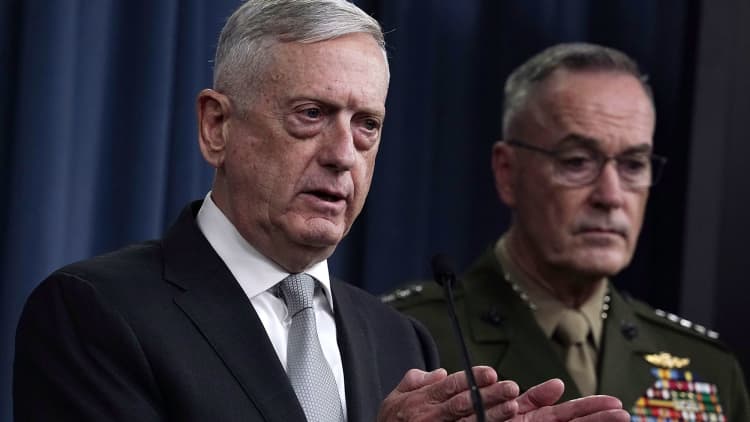
The Pentagon on Saturday described the U.S.-led intervention in Syria as successful, adding that the military strike crippled the regime's chemical weapons infrastructure.
"These strikes were justified, legitimate and proportionate response to the Syrian regime's continued use of chemical weapons on its own people," Chief Pentagon spokesperson Dana White told reporters.
At approximately 9 p.m. Eastern on Friday, the United States, Britain, and France pounded Syria in a coordinated air strike, in response to a chemical weapons attack that killed approximately 60 people last week. The U.S.-led coalition is being called the biggest intervention in Syria's civil war by Western powers since the conflict began in 2011.
"This operation was carefully orchestrated and methodically planned to minimize potential collateral damage," White added. "I can assure you we took every measure and precaution to strike only what we targeted and we successfully hit every target."
Speaking alongside White, U.S. Marine Corps Lt. Gen. Kenneth McKenzie, Director of the Joint Staff, provided details of the overnight military operation.
"We are still conducting a more detailed damage assessment, but initial indications, are that we accomplished our military objectives without material interference from Syria," McKenzie said.
McKenzie added that none of the aircraft or missiles involved in the operation were successfully engaged by Syrian or Russian air defenses.
"We are confident that all of our missiles reached their targets and at the end of the strike mission, all our aircraft returned safely to their bases," McKenzie said.
What's more, McKenzie said that more than 40 surface-to-air missiles were employed by the Syrian regime, but most of the launches occurred after the coalition strikes.
The order marked a dramatic reversal for President Donald Trump. As recently as last week, Trump had been saying that he wanted the U.S. to withdraw its forces from Syria. Then, days after a suspected chemical attack by Syrian forces on rebels, Trump warned over Twitter that missile strikes would be coming.
Trump praised Western air strikes against the Syrian government on Saturday as "perfectly executed", and added "Mission Accomplished."
"A perfectly executed strike last night. Thank you to France and the United Kingdom for their wisdom and the power of their fine Military. Could not have had a better result. Mission Accomplished!" Trump said in a Twitter post.
In a Friday speech from the White House, Trump declared that the U.S.-led coalition's intent was to "establish a strong deterrent against the production, spread, and use of chemical weapons. Establishing this deterrent is a vital national security interest of the United States."
Although Trump has indicated his unwillingness to stay in Syria long-term, the president added that "we are prepared to sustain this response until the Syrian regime stops its use of prohibited chemical agents."
A 'one-time shot' strike
Defense Secretary James Mattis called the strikes a "one time shot" and said that they were aimed at Syrian government's chemical weapons infrastructure.
"Clearly, the Assad regime did not get the message last year," Mattis said Friday evening from the Pentagon.
"Together we have sent a clear message to Assad and his murderous lieutenants that they should not perpetrate another chemical weapons attack for which they will be held accountable."
Speaking alongside Mattis, Chairman of the Joint Chiefs of Staff Gen. Joseph Dunford named three targets that were struck in the military operation. The first target was the Syrian Scientific Studies and Research Center, a government body responsible for research and development of advanced weapons systems.
"The second target was a chemical weapons storage facility west of Homs, we assess that this was the primary location of Syrian sarin and precursor production equipment," Dunford said.
The last target was a chemical weapons storage facility as well as a military command post.
And while Dunford would not describe the military assets that were deployed, he added that, "this wave of air strikes is over."
Neither Mattis or Dunford addressed possible Russian or Syrian retaliation to the U.S.-led strikes.
The coordinated strikes came on the heels of an alleged chemical weapons attack believed to be carried out by forces aligned with the Assad regime in Douma, a town that was held by Syrian rebels.
The Assad regime has denied responsibility for the April 7 attack, and has since repositioned a significant amount of air assets to Russian-controlled airfields in hopes that Washington would be reluctant to strike there.
"I am confident the Syrian regime conducted a chemical attack on innocent people in this last week," Mattis said, noting that the U.S. government had enough intelligence to carry out the strike.
Meanwhile, Russian President Vladimir Putin called for a meeting of the U.N. Security Council to discuss what Moscow decried as an unjustified attack on a sovereign state. Diplomats said the meeting would take place in New York around noon.
Syrian state media called the attack a "flagrant violation of international law." Iran's Supreme Leader Ayatollah Ali Khamenei called it a crime, and branded Western leaders as criminals.
--Reuters contributed to this report.


